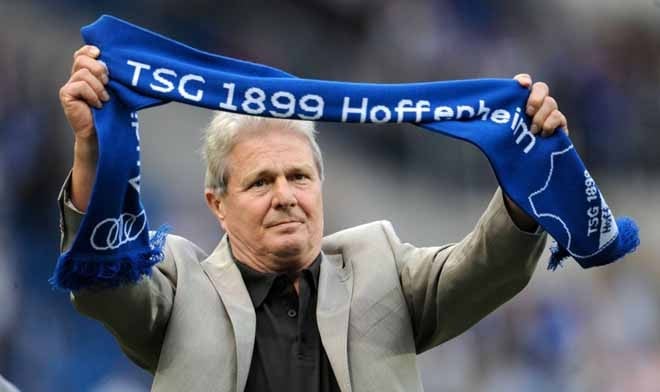

Bayern Munich is easily the most successful club in the history of the German football, having won the Bundesliga 24 times; nearest is FC Nuremberg with nine wins. In recent times, Borussia Dortmund has also hit headlines.
However, one of German football’s most remarkable tales involves a club side from a village of only 3,300 people in South West Germany.
The Cinderella story of 1899 Hoffenheim ( known as TSG 1899 Hoffenheim, until 2007) appears to be a piece straight out of fiction: A fifth division side making a remarkable progress to the Bundesliga, the top tier of the German football league, all within eight years.
The man who made it all possible was Dietmar Hopp, co-founder of SAP AG, one of the world’s biggest software companies.
Hopp, who had played in club’s youth set up, returned to his old love in 1999 as a financial backer. He put good money into the club, and there were immediate results. Hoffenhiem won the Verbandsliga and hence got promoted to the Oberliga Baden-Wurttemberg (fourth division). The very next season saw another first position, and another promotion, to Regionalliga Sud (third division) in 2001-02.
You can’t have everything going your way all the time. They struggled in the third division for some time. It was a poor 13th spot the first season. There was marked improvement with the 5th place finish the next year. Still, they continued to languish in that bracket over next few seasons, fifth and seventh positions.
Meanwhile the club had debuted in the German Cup (the knock out competition) in 2003-4 and made an instant impact. Hoffenhiem made it to the quarter final and they overcame notable clubs on the way. Apart from the two teams from the second division, they defeated the prominent Bundesliga club Bayer Leverkusen.
However, in the the 3rd division of the German football, till then, fourth position, came in 2005-6 but the much awaited promotion hadn’t arrived.
The ambitious Dietmar, who has been ranked among world’s 700 richest people (according to the Forbes magazine), had become a bit disappointed for the lack of further progress; the Hoffenheim was stuck in the third division for quite a few years now. The software mogul desired some concrete steps taken. Hence, the club looked for improving the playing as well as the support staff. In 2006, players with considerable experience of Bundesliga, notably Jochen Seitz and Tomislav Maric were bought. The master stroke was the hiring of Ralf Rangnick as the manager of Hoffenheim on a five year contract; he had the experience of managing no less than four Bundesliga teams. Only two seasons back, Rangnic had had a wonderful season with Schalke 04, guiding them to glory in three major competitions: second in the Bundesliga, winning the DFB-Ligapikol (German League Cup) and reaching the knock out stage of the UEFA Cup, now called The Europa League.
The shrewd investment paid off in the very first season as Hoffenheim finished second in Regionallla Sud in 2006-07 thus winning promotion to the Bundesliga second division. The 2007-08 was club’s first venture in a fully professional lane. They struggled in the beginning with just one point from the first four games. However, an astonishing turn around saw them jump from the 16th position on match day four to second place on match day 23, and that is how they finished. This second position in the very first season in the 2.Bundesliga earned Hoffenheim an automatic promotion to the Bundesliga, the topmost tier of the German league.
It is pertinent to mention that in terms of average attendance, the Bundesliga is world’s number one football league; and the second highest in any sports league. This season (2013-14), the average attendance has been 43,277. Moreover, the German league boasts the highest number of goals per match among all the top five leagues of Europe (English, Spanish, Italian, French and German).
Undeterred by all this, Hoffenheim made a stunning debut in the Bundesliga. They rose to the top of the table quickly and managed to stay there when the winter break arrived thus winning the Herbmeister (Autumn Champion) title.
With their trio up front, Bosnian Vedad Ibisevic, Senegalese Demba Ba and Nigerian Chinedu Obasi in superb form, the club mesmerized the opponents and captivated the viewers with their attacking brand of soccer, 42 goals in 17 matches. Many, among the experts, opined Hoffenheim could win the championship in their very first appearance.
The fate thought otherwise.
Ibisevic, later named the Bosnian player of the year (2008), who had been leading the Bundesliga scoring charts with 18 goals, tore a knee ligament while practicing during the winter break and was unavailable for the remainder of the season. It was a devastating blow. Apart from his absence, the team suffered from further injuries and suspensions. All this meant Hoffenhiem couldn’t capitalize on the success of the first half of the season. They eventually ended seventh- still a very respectable position for the newcomers in the top division. Hoffenheim has stayed in the Bundesliga since then.
Before being promoted to the Bundesliga in 2008, the club played in Dietmar-Hopp-Stadion built in 1999 with a capacity of 5,000.
In 2006, Hoffenheim FC made their loftier ambitions clear, when bank-rolled by Dietmar Hopp, they decided to build the new 30,000 seat Rhein Necker Arena suitable for hosting Bundesliga games. Indeed, the state of the art stadium, costing 100 million euros, was inaugurated the season the club made their first appearance in the top division.
The Hoffenheim fairy tale is now permanently enshrined in the game’s literature. Many refer it as a model for study.
But what is the most romantic about this story?
Everyone dreams about leading his own youth team into the country’s first division?
One man, Dietmar Hopp, actually did it.